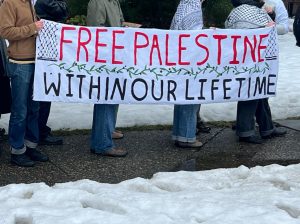Exploring this year’s academic theme: Climate Reckonings, Climate Justice
November 4, 2021
Climate Reckonings, Climate Justice is this year’s academic theme, making it the centerpiece for various events and discussions throughout the year. The academic theme committee, composed of faculty members from various departments, including geology professor Kirsten Nicolaysen, works to create spaces for discussion around the issue of climate change.
“We’re taking a trajectory this year of having events at the beginning [of the year] that have a lot of information and data about climate change, but many of the other events that we’re scheduling are about solutions,” Nicolaysen said. “They’re also focusing on the arts and the humanities and how those help us process the emotions around climate…coping with grief about the ways our lives might change in the future [and] coping with the emotions of concern or anxiety.”
As a liberal arts school, Whitman is in a unique position to hold conversations about climate change across disciplines. Climate change is an important topic in any year, but especially now. The Intergovernmental Panel on Climate Change (IPCC), the United Nations group that assesses climate change data, recently released its 2021 report.
“[This report] is very clear that the robust modeling that they have done says that we have a specific climate budget remaining to us, and at the rate that we are globally producing carbon emissions, that means we are going to exhaust that carbon budget in less than 10 years,” Nicolaysen said.
Climate change’s effects vary across the globe, but here in Walla Walla, it could have a drastic impact on the local economy, according to anthropology professor Eunice Blavascunas.
“Walla Walla is a bread basket to the world,” Blavascuanas said. “Most of its wheat gets exported, but a hotter drier climate will impact our ability to grow wheat.”
ASWC Sustainability Committee Chair Nat Lange ‘24 emphasized the importance of being aware of climate-related issues in one’s own home.
“One of the most powerful individual actions Whitman students can take is to educate yourself about what’s happening in the community you live in,” Lange said. “An individual has huge power to push institutions they are a part of, Whitman in this case, towards a more sustainable future.”
While part of the academic theme committee’s goal is to help Whitman understand the effects and drastic reality of climate change, they also emphasize taking action to reduce policies detrimental to our climate.
Blavascunas and Nicolaysen both highlighted the importance of voting and putting pressure on politicians to demand action on climate change.
“We can learn about climate change on this campus…by joining youth climate movements, such as the Sunrise Movement, by voting for policy makers committed to addressing the twin confluence of climate change and social injustice,” Blavascunas said.
In addition to this year’s academic theme, Whitman is making progress towards operating more sustainably, including the work of the ASWC Sustainability Committee.
This group “works to uplift student voices and projects relating to sustainability,” according to Lange.
On Tuesdays, they hold Cleveland Climate Conversations where students can share opinions and ideas on how to make Whitman more sustainable.
In addition, the Office of Sustainability is updating Whitman’s Climate Action Plan (CAP), which was originally created in 2016.
“A liberal arts education teaches us how to process knowledge, verify knowledge and, perhaps most importantly, use our imaginations,” Blavascunas said. “Using our imaginations is so important to the social reorganization that is necessary if we are going to live without breaking the biological systems that feed and support us. Solving climate change is not just a technical fix of relying on one technology over another.”
An interdisciplinary approach to climate change is especially possible at a school like Whitman, and there are a variety of climate-related courses being offered next semester.
“Really addressing the problem means looking at what causes the hoarding and greed of humans at a scale that causes so much human misery and environmental destruction,” Blavascunas said. “Let’s use this College and our education to not be elites but to be communicators, healers, scientists and artists who can build bridges.”





